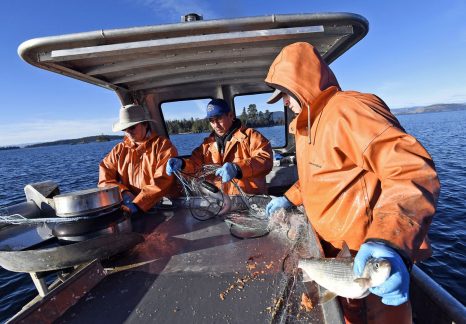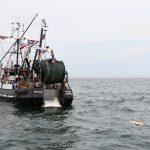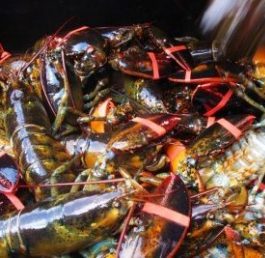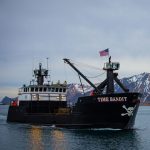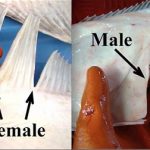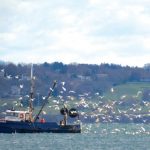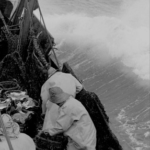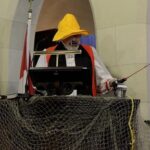Category Archives: Inland Fisheries
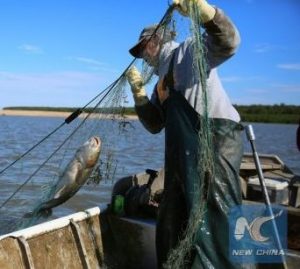
Federal help potentially coming to help fight the War On Carp
The war on Asian Carp is nowhere close to being over. Lyon County Judge Executive Wade White just returned from Washington D.C. and says help could be on its way. During that trip, White requested 12 million dollars in funding. White says that money will go toward Asian Carp barriers at nine different hot spots on the lake, subsidies for fisherman, and research on carp control methods. Also in the works – a change to fishing restrictions that would allow commercial fisherman to fish on the weekends to help catch more Asian Carp. Current regulations restrict them from doing that. >click to read<11:31

The story of how salmon got to the Great Lakes, told by the man who made it happen
Close to 10 million chinook and coho salmon swim in Lake Michigan, Lake Huron and Lake Superior. There were none when Howard Tanner started as the chief of the Michigan Department of Conservation’s Fish Division in 1964. His boss, Ralph MacMullan, spent much of their first meeting lambasting the fish department for its previous lack of action and dysfunction. Heaps of dead fish were washing up on beaches, the lakes were overly commercially fished and there was little recreational fishing to speak of. He gave Tanner a mandate: “Do something. “And if you can,” he added, “make it spectacular.” By introducing salmon into the Great Lakes in the 1960s, Tanner did just that. >click to read<12:26
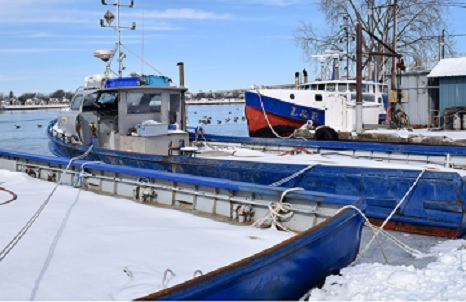
Lake Huron – Thriving family fishery spans 2 centuries, 5 generations
Tim Purdy gets a little emotional when he talks about his son Josiah becoming the fifth generation to work at the family fishery in Point Edward. “It’s good to see your kids want to be involved,” Purdy says. Though proud his son is part of a thriving business that’s operated for nearly 120 years, he’s worried too. “We’re trying to figure out how to stop the Asian carp,”,,, >click to read< 18:07

Illinois Lt. Gov: Michigan’s carp money would be too little, too late
It’s not that Illinois is being rude, or even dismissive, it’s just that Michigan’s promise of $8 million to help keep Asian carp in the Illinois River doesn’t solve today’s problem, according to the Rauner administration. Illinois Lt. Gov. Evelyn Sanguinetti said Illinois needs to focus on its Asian carp problem immediately.,,“He indicated that we need to act now.,,, “Imagine if we were able to take the money and double down on our commercial fishing. That’s where we are going to see a bigger impact,” Sanguinetti added. >click to read<16:35
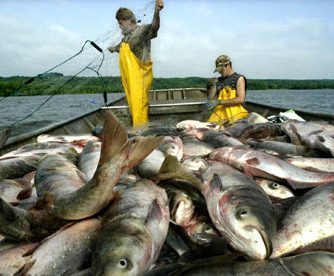
Illinois to Michigan: Put your money where the carp is
Gov. Bruce Rauner said today that Illinois is happy to accept $8 million from the State of Michigan to put toward the fight to keep Asian carp out of the Great Lakes — provided the funds can be used now to advance the effort. Unfortunately, Michigan Gov. Rick Snyder’s current offer of financial assistance isn’t applicable until 2028. Rauner sent a letter today to Snyder with a counterproposal to continue the fight against Asian carp. The Illinois governor said the best way to reduce the risk of Asian carp invasion is to enhance commercial fishing strategies in the Upper Illinois River and the Alton, LaGrange and Peoria pools today. >click to read<12:37
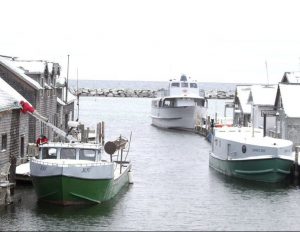
Historic fishing village strung with lights for holiday season
Leland’s Fishtown will pull off a first when it bathes its collection of historic shanties in a holiday glow. A total of 3,800 feet of classic warm white lights custom cut for each shanty will illuminate Fishtown through the holiday season — something that’s never been done before, said Amanda Holmes, executive director of Fishtown Preservation Society. The light display honors long-time Fishtown supporter Keith Burnham, who will flip the switch and light things up Friday at 5:30 p.m. during the Fishtown in Lights event. Hot cider and cookies will be served and Leland High School will be on hand to lead carolers. >click to read<09:29
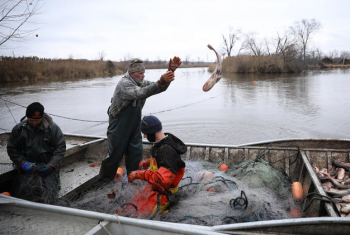
‘Carp cowboys’ round up invasive Asian carp as Illinois, federal officials debate costly measures to protect Lake Michigan
In Illinois, current strategies have successfully reduced the leading edge of the Asian carp population by 93 percent since 2012, according to sonar scans. By removing more than 1 million pounds of carp annually in the past several years, the state has contained the adult population to the Dresden Island Pool, 47 miles away from Lake Michigan, near Minooka, Ill. But computer modeling suggests it’s not enough. To repel Asian carp, about four times that amount needs to be removed from downstream.,, On Tuesday, near the banks of Sheehan Island where Asian carp like to take refuge, state-contracted fisherman Shawn Price gunned the engine of his boat while his father hit a wooden stick on the side. Minutes later, Shawn Price began pulling in nets chock-full of Asian carp. >click to read<09:01
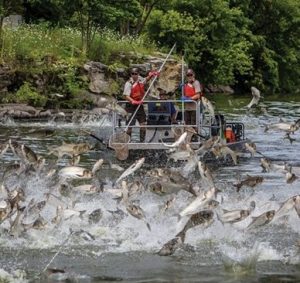
Pricetag of Asian Carp Defense Project Climbs to $778 Million
The forecasted pricetag of a planned Asian carp defense system near Joliet, Illinois that would hopefully prevent the invasive species from infiltrating the Great Lakes has now climbed to $778 million, up from an initial estimate of $275 million, according to an update last week from the U.S. Army Corps of Engineers. As reported by the Detroit News, the project, which would be finished sometime between 2025 and 2027, will now be reviewed by state and federal agencies. If Congress funds the initiative, an electric barrier would be installed as well as underground speakers to essentially blast noise at fish to stop them in their tracks northbound. >click to read<12:12

Eating the Most Hated Fish on the Mississippi
The presence of silver carp in the Mississippi dates back to the 1960s, when scientists in Arkansas brought a few different species of Asian carp into the country to see if they might offer a chemical-free way to clean algae out of fish ponds. When funding for the experiment dried up, the fish were released to the waterways and swiftly began outcompeting local fish. Today Asian carp—mostly bighead, silver, and grass carp—make up 90 percent of the biomass in parts of the Ohio and Mississippi rivers.,, One of the biggest challenges for Fin, Schafer, and Two Rivers is finding enough fishermen. Commercial river fishing is a dwindling industry along many parts of the Mississippi and Ohio,,, >click to read<14:46

To our valued readers here at Fishery Nation.
To our valued readers here at Fishery Nation. You have probably noticed recently there have been no postings on our website. I’m sorry to say that I have recently taken ill and have been hospitalized for the past week in the intensive care unit of my local hospital.
As you know, I’ve made it a priority in my life to keep you all informed on the goings on in our commercial fisheries here in the US and also abroad with stories and information that we feel is important to you, and also stories of interest. For the past seven years we have fulfilled this goal 365 days a year, every single day!
Please bear with me as we get through this situation and I am able to get back on my feet and continue what has become my passion, and mission in life, to keep the commercial fishermen informed and up to date as to the goings on in your industry.
If all goes well this will be a short period of time and I’ll soon be on my feet and able to get back at it.
Thank you one and all for your support and understanding. God bless you all, stay safe out there and please stay in touch with us.
Sincerely,
Borehead
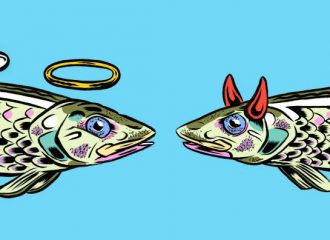
What Happens When Humans Fall In Love With An Invasive Species
Some people miss the glory days of Lester River fishing even when evidence suggests that Lake Superior and the people who rely on it are better off now. Facts, it turns out, can’t always sway emotion or reshape business plans. And these issues are not unique to smelt. All over the world, you’ll find invasive species that are beloved by humans — even as these foreign plants and animals alter or damage the environment. The fight against invasive species is often framed as a technological problem — how do you selectively eliminate a species once it’s made itself at home in an environment? But in reality, it’s also a question of human hearts and minds. And those might be the harder obstacle to clear. >click to read<19:00
Kentucky Awards First-Ever Fish House Contract to Fight Asian Carp
 Gov. Matt Bevin today announced the award of the state’s first-ever fish house contract, in an innovative step to attack the Asian carp problem in western Kentucky and encourage job growth in the region..,, The Kentucky Department of Fish and Wildlife Resources is pledging up to $4 million in loans and incentives for the fish house and commercial fishermen.,, “Commercial anglers currently harvest two million pounds of Asian carp from Kentucky’s waters each year,” said Ron Brooks, Kentucky Fish and Wildlife’s fisheries director. “We believe this program can increase that catch to 20 million pounds across the state within the next five years.” >click to read<13:13
Gov. Matt Bevin today announced the award of the state’s first-ever fish house contract, in an innovative step to attack the Asian carp problem in western Kentucky and encourage job growth in the region..,, The Kentucky Department of Fish and Wildlife Resources is pledging up to $4 million in loans and incentives for the fish house and commercial fishermen.,, “Commercial anglers currently harvest two million pounds of Asian carp from Kentucky’s waters each year,” said Ron Brooks, Kentucky Fish and Wildlife’s fisheries director. “We believe this program can increase that catch to 20 million pounds across the state within the next five years.” >click to read<13:13 
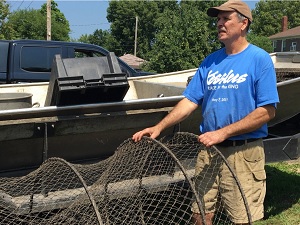
Fourth-generation fisherman keeps tradition alive in Wisconsin
Just as his ancestors did, Mike Valley draws his living from the Mississippi River. But the 1,000-pound catch that fills his handmade nets and homemade jon boat is not destined for wholesalers. Twice a week, Valley and a couple of his friends feverishly clean their overnight haul of carp, buffalo, catfish, perch and sturgeon, which soon will be snatched up by the enthusiastic customers of his retail store, Valley Fish and Cheese.,, >click to read<11:59
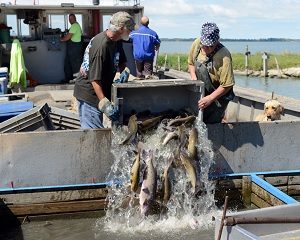
Commercial fisherman faces trial in Huron court
A longtime commercial fisherman in the Sandusky area says he’s worried about going out of business if his company loses a trial in Huron next month. Dean Koch, 69, Crystal Rock, no longer goes out on the boat run by his Whites Landing Fisheries Inc. His son Drew Koch now serves as the captain. But Koch says his company will be put out of business under the state’s “three strikes” rules if the company is found guilty of the claim that it unlawfully harvested 100 pounds of fish in 2015 in a location of Lake Erie where commercial fishing wasn’t allowed. >click to read<11:23
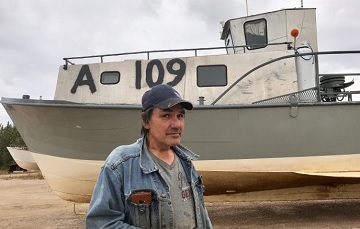
Difficult fishing season for some fishers in Hay River, N.W.T.
It’s been a difficult summer for commercial fishers on Great Slave Lake, at least according to one fisherman who has been in the business for 40 years. Although he’s caught plenty of fish this year, Duncan Richardson said they haven’t been the right kind. Last year was a bumper year for whitefish, which is where the money is. But, this year, Richardson guessed 40 per cent of his catch was whitefish, while the other 60 per cent was trout and coney. He said he’ll be lucky if he breaks even this year. “I don’t know if it was the water or whatever it is, but it sure screwed things up,” said Richardson. “It was a bad season. Just bad. I don’t know how to explain it.” >click to read<10:37
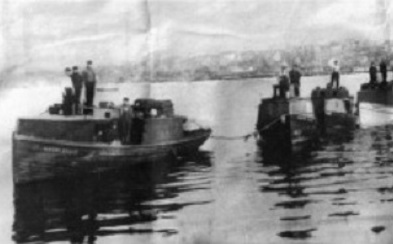
Help us learn more about the “Michigan Bears” and the men who fished aboard Gloucester’s oldest fishing vessel, the Phyllis A.
On September 6, 1920 five small vessels arrived in Gloucester Harbor and tied up in Smith Cove near Rocky Neck. The little boats and the 20 men who crewed them, had spent 24 days traveling 2,200 miles from Charlevoix, Michigan to start a new life for them selves and their families, doing a method of fishing that had been introduced, but not welcomed, by the fishing industry on the east coast of the Atlantic in the late 1800’s,,, gill net fishing, used here in Gloucester and the East coast to this day. >click to read<21:21
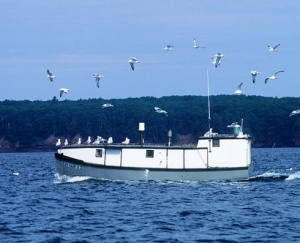
Commercial Fishing Operations Reporting Record Catch Along Lake Superior’s South Shore
Commercial fishing operations near the Apostle Islands of Lake Superior are reporting record numbers of whitefish and a strong recovery of lake trout from a low in the early 2000s. During a presentation to the state’s Natural Resources Board, Craig Hoopman, of Lake Superior whitefish, said he is seeing record numbers of young whitefish and a strong rebounding of lake trout numbers. Hoopman, who chairs the state Department of Natural Resources Lake Superior Commercial Fishing Board, said fishing has been phenomenal so far this year. “We’re averaging between 2,500 and 3,000 pounds of whitefish per day in the traps right now and releasing thousands of sub-legal fish,” said Hoopman. “There’s just multiple year classes of fish.” >click to read<12:38
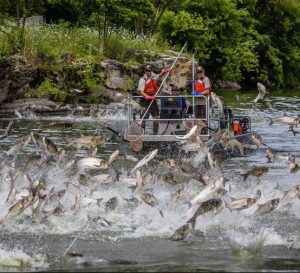
As Asian Carp Invade Tennessee, State Asks Fishermen To Help Fight Back
The scale of the asian carp problem has gotten considerably worse in recent years as the invasive species moves further into Tennessee. The state Wildlife Resources Agency is developing a plan to keep the carp contained and eventually push them back. The agency is working with other states and the federal government to sponsor fishing tournaments, create incentives for commercial fishermen and test out new technology to keep the carp from spreading out of West Tennessee. The agency is funding a $500 thousand program to develop new markets for the carp beyond fertilizer, like getting more of them into restaurants. >click to read<15:26
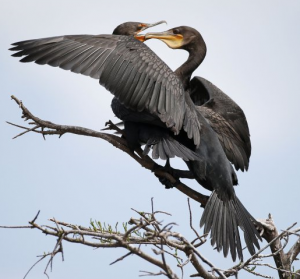
Cormorant, Fisheries Act concerns need to be addressed
Cormorant management and Canada’s Fisheries Act are just two of the issues that members of the Committee of Advisors to the Great Lakes Fishery Commission have raised and want action taken on by the Canada and US governments,,, “One of the concerns our committee has raised is with Canada’s Fisheries Act proposals-in particular with proposed marine protected areas,” Mr. Purvis told the Recorder.,, Another area of concern, said Mr. Purvis, is for needed cormorant management control. “I know in areas like the Les Cheneaux Islands in the US there are no fish left due to cormorants. They decimated the perch fishery for instance. And the US government had at one time allowed for a cull of cormorants, then they took this away. Now the perch fishery in that area is gone.“ >click to read<08:15
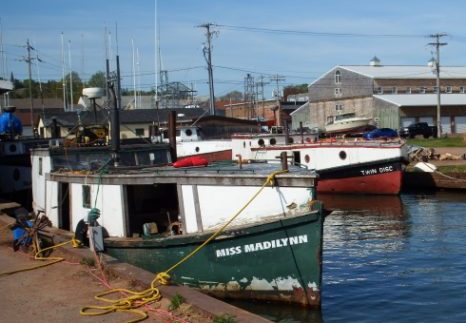
More Fishing Tugs 7
This road trip was partly about seeing more fish tugs, the focus of the next few posts. One of the current hubs of fishing tugs still fishing is the Bayfield Peninsula, jutting out of northern Wisconsin into Lake Superior. Bayfield still had chunk ice in the harbor on May 9! Let’s start out at Bodin Fisheries, and the docks there. Photo’s, >click to read<14:36
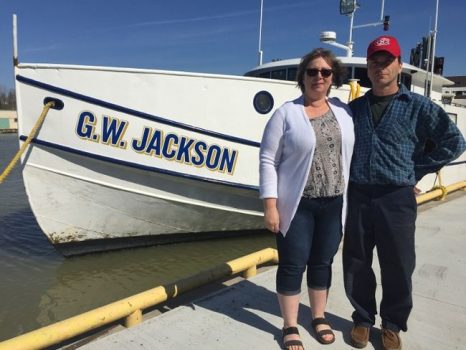
Jacksons Fisheries closes after three generations
Joe Jackson has been out on the boat fishing for the family business since he was 18-years-old, running the G.W. Jackson vessel, built by his grandfather George in 1963. After 32 years in the labour intensive industry of commercial fishing, Joe has decided to step away from Jackson Fisheries. His wife Tammy, who ran Jacksons Fish Market for 13 years, has also stepped away as potential buyers haven’t shown interest in keeping the market alive. The market was a reliable source for a wide variety of local, fresh fish, especially yellow perch. >click to read<18:28

Carp Conundrum: Too Many Fish, Not Enough Fishermen
Two Rivers Fisheries in west Kentucky has more than doubled its Asian carp processing since it opened in 2013. Employees at the Wickliffe fishery are working on a load of silver carp caught by contracted commercial fishermen. The crates of fish represent a small amount of the more two million pounds that Two Rivers processes. “We need at least 10 groups of full-time commercial fishermen, ”,,, “I’ve got fishermen here that are making $2,000 to $3,000 a week… We are trying to get people to start fishing for this fish because this fish is here to stay and we are here to stay.” >click to read<16:22
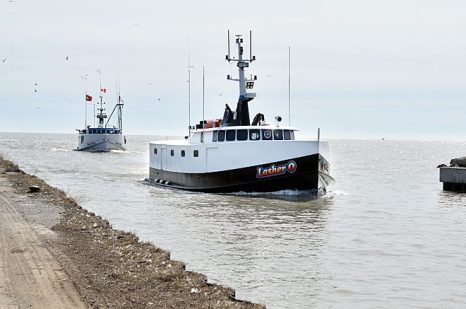
New Season For Lake Erie Fleet
The largest fresh water commercial fishery is located in Wheatley on the shores of Lake Erie. Pickerel, or walleye, and perch are the main commercial species sought after by the Lake Erie fleet of fishing vessels. The fleet, however, is a collection of boats, known as fish tugs, working the lake for a number of different processors centered in Wheatley, like Cavendish, Loop, Presteve, and Taylor. The fleet of almost 45 boats returned to the lake about three weeks ago after the winter hiatus. Over 2 million pounds of perch will be harvested from Lake Erie this year and almost 6 million individual pickerel. >click for photos< 12:05

US Commerce Secretary Wilbur Ross questions safety of seafood imports
U.S. Commerce Secretary Wilbur Ross addressed U.S. fisheries regulations and his concern about the quality of seafood imports with the U.S. Congress on Tuesday, 20 March, and he said he’s looking for NOAA Fisheries officials to work harder to reduce the country’s seafood trade deficit.,, “It’s one of my pet peeves,” Ross said, when asked by U.S. Rep. Steven Palazzo (R-Mississippi) what he planned to do to reduce the country’s seafood trade deficit. “I hate the idea that with all the water surrounding us and all the water inland that we have a trade deficit in fish. >click to read<13:05
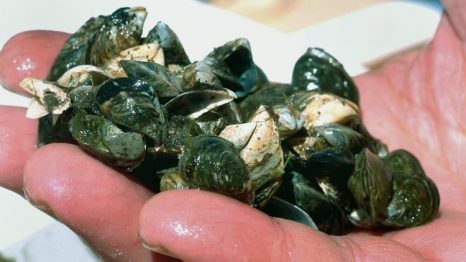
Lake Michigan has become dramatically clearer in last 20 years — but at a steep cost
Decades ago, Lake Michigan teemed with nutrients and green algae, casting a brownish-green hue that resembled the mouth of an inland river rather than a vast, open-water lake. Back then, the lake’s swampy complexion was less than inviting to swimmers and kayakers, but it supported a robust fishing industry as several commercial companies trawled for perch, and sport fishermen cast their lines for trout. But in the past 20 years, Lake Michigan has undergone a dramatic transformation. >click here to read< 16:38

FISHBILL-US: Fishermen, Lets unite like never before!
It becomes clearer by the day that our industry needs protection in the form of legislation for fishermen and supporting industries. While fishermen and those supporting industries are struggling to survive in various regions, many of them await federal assistance in already declared federal fishery failures, much of it beyond their control. Congress has mandated the NOAA is the agency that controls the “best available science”, while other data is not considered, by law. This must be addressed as we watch the industry retract based on the science many of us have no confidence in. They control our fate. click here to read the full post 20:22

US Fish-Bill Unity – Sam Parisi
Recently, Fisherman Jon Johnson wrote an opinion piece in Fisherynation.com (Why Fishermen Fail To Unite and Resist Being Swept Off of Our Historic Fishing Grounds) about the reasons for, and lack of unity in the U.S. fishing industry on fishery issues affecting the industry, and while I agree with most of his points, we must remember we are at fault a lot of the time, without knowing even knowing it. I have always thought if, we together, could agree on the need for a US Fish Bill, we could get real stability for all in our US Fisheries. I am not alone, as I am receiving calls from many representatives of fishing organizations, and of various fishing communities. We need input from fishermen in every region, from every fishery, and I invite you to get involved. Merry Christmas from Gloucester Mass! Sam Parisi, Gloucester 978 491 7722 [email protected] 16:58






